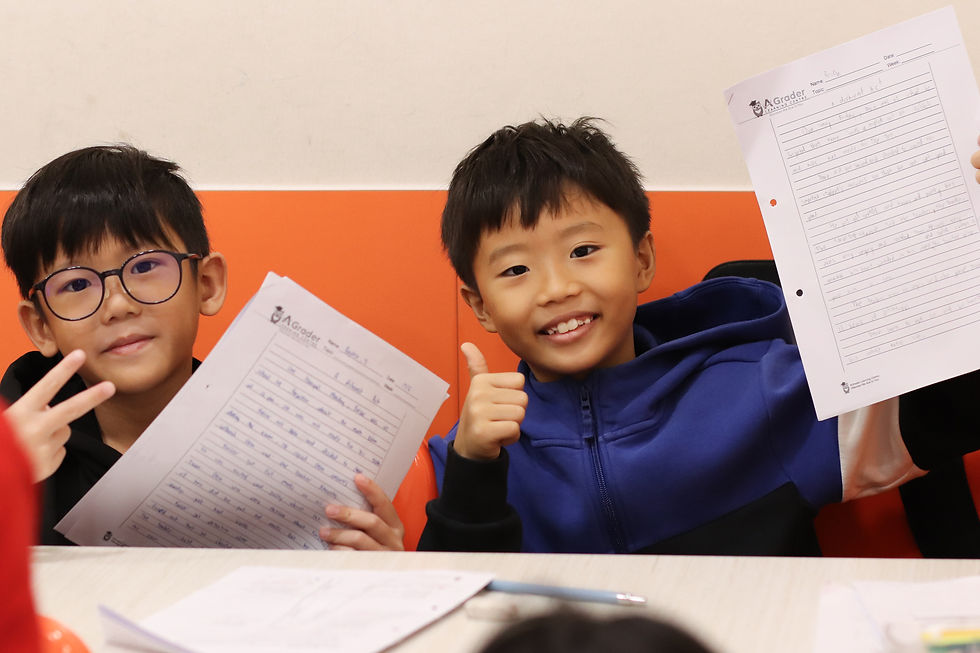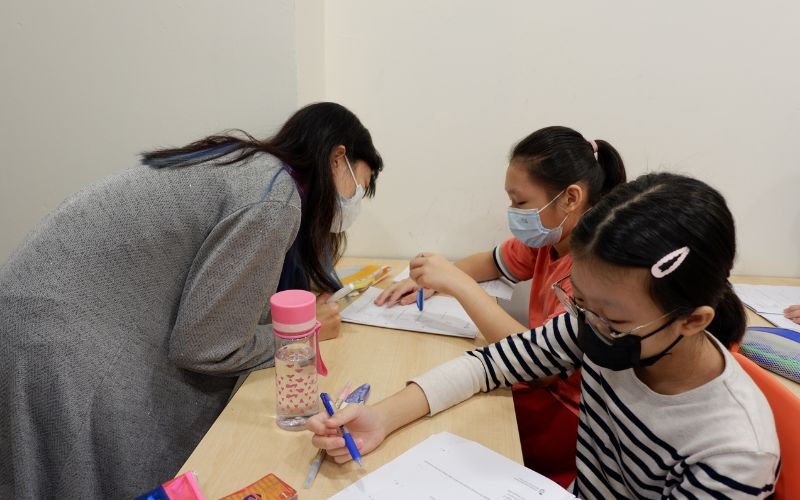Vocabulary for Primary School Students: 5 Tips to Help Your Child Remember New Words
- AGrader Learning Centre
- Jul 27, 2023
- 5 min read
Updated: 8 hours ago

Words are the building blocks of language, and a strong primary vocabulary sets the stage for your child's linguistic growth. As parents, you play a vital role in supporting their language development.
In this article, we will delve into five effective techniques that can assist your child in remembering new words. By incorporating these strategies into your everyday interactions, you can create a language-rich environment that nurtures your child's vocabulary acquisition and boosts their language proficiency.
1. Make It Relevant
Making new words relevant is crucial for parents to support their primary children's language learning and vocabulary retention. When new words align with a child's interests, they become more engaged, sparking curiosity and active participation. Introducing words in familiar contexts enhances understanding and increases the likelihood of proper usage in the future.
Personal relevance empowers children to express themselves effectively as they connect language to their experiences. This connection fosters long-term retention and positive associations with words, making them more likely to be remembered and used correctly. The process also builds confidence, encouraging children to explore more vocabulary and become better communicators.
By incorporating a child's interests into language learning, parents foster a love for education and create a positive attitude towards learning in general. Making new words relevant empowers children to take charge of their learning, seeking out related words independently. This autonomous approach helps them develop essential self-directed learning skills, benefiting their academic journey and beyond. In conclusion, relevant vocabulary learning enhances retention and cultivates a lifelong passion for education and effective communication.

2. Contextual Learning
Parents should encourage contextual learning for their primary children as it offers several benefits for vocabulary acquisition and retention. Contextual learning involves using new words in relevant situations, conversations, or activities, enabling children to grasp their meanings more effectively. This approach enhances understanding by showing how words function in real-life scenarios, leading to more precise language use. Connecting new words to memorable experiences promotes improved retention and strengthens long-term memory.
Moreover, learning words in context allows children to see the practical application of vocabulary in communication. Using new words in writing, discussions, and storytelling fosters creativity and imagination, reinforcing the vocabulary while developing storytelling and writing skills. Contextual learning also promotes language fluency as children become more comfortable incorporating new words seamlessly in various situations, leading to more natural and expressive communication.
By discussing new words within specific contexts, children enhance their comprehension and infer meaning from real-life scenarios, cultivating critical thinking and problem-solving skills. Successfully using new words in context boosts children's language confidence, motivating them to explore and learn more words. Overall, contextual learning empowers children to become skilled communicators with a lifelong passion for language learning.
3. Vocabulary Games
Vocabulary games are an entertaining and effective way for primary school-aged students to expand their vocabularies. Scrabble, Boggle, and word association exercises make learning enjoyable, encouraging students to actively improve their vocabulary. These games enhance learning by exposing students to words in various settings, increasing understanding and memory.
Vocabulary games not only increase the richness and diversity of a child's vocabulary, but they also foster creativity and critical thinking. Word association games and charades enable youngsters to think creatively by linking words to related concepts and acting out meanings. Furthermore, playing word games with family and friends promotes social skills and language proficiency through dialogue and collaboration.
With personalised and adjustable learning, parents can customise vocabulary games to their child's interests and skill level, ensuring engagement and a sense of accomplishment. The practical use of new terms in games improves confidence as youngsters apply their learning to real-life circumstances, incorporating new words into discussions and writing. Overall, word games foster a positive and effective learning environment, cultivating a love for language discovery and encouraging youngsters to become proficient communicators.

4. Reading
Encourage primary school students to acquire new words through reading as it dramatically improves vocabulary. Reading exposes youngsters to a wide range of vocabulary beyond what they hear in regular conversations, introducing more advanced language found in books and articles. This exposure to diverse language allows for discovering new words and idioms.
Another advantage of reading is that youngsters grasp word definitions and usage in relevant situations. This effective technique enables students to infer the meanings of unknown terms based on the general context of the text, encouraging greater vocabulary acquisition.
Encouraging youngsters to read materials slightly beyond their current reading level challenges them and broadens their reading comprehension. They strengthen their ability to understand concepts when they encounter increasingly complex texts, reinforcing their vocabulary development.
Furthermore, reading actively involves children in the learning process by encouraging them to investigate the meanings and applications of unknown words, resulting in improved retention and application in their communication. Reading fosters autonomy in language exploration and promotes a lifelong love of reading. Parents can create a pleasant and nurturing learning environment for their children by reading together, discussing stories, and discovering new terms. Overall, encouraging reading as a means of acquiring new vocabulary words is beneficial in developing strong language abilities and a deep love of learning.
5. Repitition
Children in primary school greatly benefit from acquiring new vocabulary words through repetition, and parents should promote this practice. Children's ability to remember and confidently use new words is aided by strengthening brain connections associated with repetition. Words become more familiar through exposure, decreasing the likelihood of forgetting them.
Children's understanding of word meanings and usage benefits from being exposed to new words in various contexts. Actively involving children in the learning process through repetition improves memory and instils pride in their growing vocabularies. Children's language development benefits from repetition as it increases their comfort with trying new words and inspires them to expand their vocabulary.
Children's ability to learn and remember new words relies on the solid foundation they build through repeated exposure. Making strong mental connections between words and their definitions helps with both short-term and long-term memory. Ultimately, children will be more confident and becoming articulate speakers with a wide range of vocabulary.

Nurturing your child's primary school English vocabulary list is a crucial responsibility for parents as it lays the foundation for their linguistic growth and communication skills. This article has explored five effective techniques to help your child remember new words and enhance their language proficiency.
By incorporating these five techniques into your daily interactions with your child, you can create a language-rich environment that supports their vocabulary acquisition and language development. Empowering them to remember and use new words effectively will have lasting benefits throughout their academic journey and beyond, fostering a love for learning and effective communication in the years to come.

AGrader Learning Centre's Primary English Tuition program covers all essential exam sections, including oral, cloze, grammar, comprehension, and word order, ensuring your child's success with top marks effortlessly. Thousands of primary students have already benefited from our program, falling in love with English and achieving remarkable exam scores. Even if your child previously struggled with English, our system is designed to help them excel.
Enrol them in AGrader Learning Centre Primary English lessons now and witness their transformation into confident, proficient English speakers and successful exam achievers!




Comments